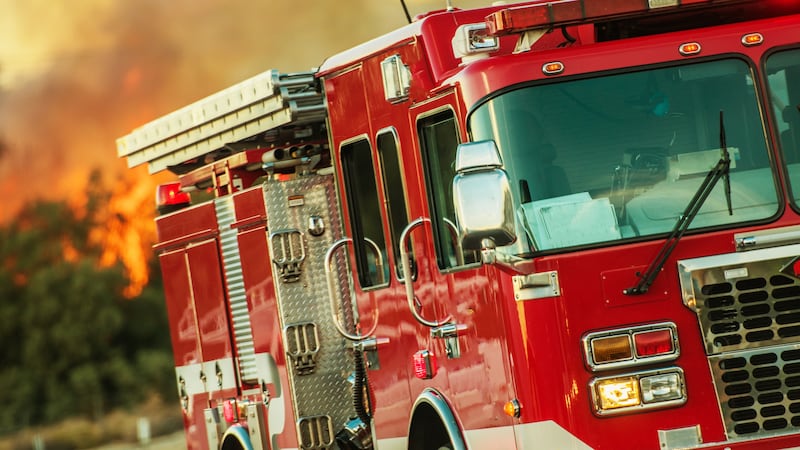EAST PALESTINE, Ohio — A freight train carrying hazardous materials derailed on Feb. 3 near East Palestine, Ohio, sending toxic chemicals into the air, soil and creeks in the area.
The incident has caused lingering concerns and anxiety for residents of the town, located near the Ohio-Pennsylvania border, as well as increased scrutiny of railway regulations and calls for reform.
Here's a look at what's unfolded so far.
Feb. 3
About 50 cars of a freight train operated by Norfolk Southern derailed in a fiery crash on the outskirts of East Palestine around 8:54 p.m. local time. Security camera footage from a local residence captured roughly 40 minutes before the derailment showed sparks and flames under one of the 149 railcars -- which could have been a wheel bearing overheating, according to the National Transportation Safety Board.
Eleven of the derailed cars were transporting hazardous materials, five of which contained vinyl chloride, a highly volatile colorless gas produced for commercial uses. Several cars were also carrying ethyl acrylate and isobutylene, which are considered to be very toxic and possibly carcinogenic, according to the Centers for Disease Control and Prevention and the National Institutes for Health.
First responders started evacuating residents within 1 mile of the derailment site, impacting up to 2,000 residents. There were no injuries reported from the accident, according to officials.
Feb. 5
Amid concerns an explosion could take place, authorities ordered a mandatory evacuation of homes and businesses within a mile of the derailment site.
Feb. 6
Authorities expanded the evacuation zone to within 2 miles of the derailment site.
Around 4:40 p.m., responders began an hourslong controlled release and burn of vinyl chloride in five derailed tanker cars, which were carrying 115,580 gallons of the flammable gas, that lasted for several hours. A large ball of fire and a plume of black smoke filled with contaminants could be seen billowing high into the sky from the smoldering derailment site as the controlled burn took place, prompting concerns from residents about the potential effects.
Feb. 8
A mandatory evacuation order was lifted after air and water samples taken the day before were deemed safe, officials said.
Feb. 10
The EPA reported in a letter to Norfolk Southern that vinyl chloride, butyl acrylate, ethylhexyl acrylate and ethylene glycol monobutyl ether were released during the incident and have been detected in samples from several creeks near the derailment site.
Feb. 13
In an open letter, Norfolk Southern Railway President and CEO Alan Shaw stated that the company was committing $1 million to a community support fund as a "down payment" on its contribution to rebuilding the village.
"I hear you, we hear you," Shaw said. "My simple answer is that we are here and will stay here for as long as it takes to ensure your safety and to help East Palestine recover and thrive."
Feb. 15
Residents confronted local, state and federal officials during a town hall, where many voiced health and safety concerns a week after the evacuation order was lifted and called for assurances that the testing will protect themselves and their loved ones before moving back into their homes.
State and federal officials have maintained that the air, soil and water surrounding the crash site remain safe enough for residents to return -- and that contaminated waterways were contained.
Feb. 16
Ohio Gov. Mike DeWine spoke with White House officials and requested on-the-ground federal assistance in East Palestine, according to his office.
Feb. 17
A plume filled with contaminants that floated over the Ohio River in the wake of the incident had "completely dissipated," DeWine told reporters.
Feb. 18
The Federal Emergency Management Agency deployed a team to East Palestine to help support the ongoing operations.
Feb. 19
U.S. Secretary of Transportation Pete Buttigieg sent a three-page letter to Norfolk Southern Railway's president, accusing the company of repeatedly prioritizing profit over safety.
"The future must not resemble the past when it comes to your company's and your industry's follow-through on support for stringent safety policies," Buttigieg wrote. "Major derailments in the past have been followed by calls for reform -- and by vigorous resistance by your industry to increased safety measures. This must change."
Feb. 21
U.S. EPA Administrator Michael Regan announced that his agency ordered Norfolk Southern "to conduct all necessary actions associated with the cleanup from the East Palestine train derailment."
The rail operator will be required to continue cleaning up the contaminated soil and water and transport it safely; reimburse the EPA for cleaning services; and attend public meetings at the EPA's request and share information. If Norfolk Southern does not comply, the company will be ordered to pay triple the cost, according to Regan.
Meanwhile, amid residents' health concerns, a medical clinic opened in East Palestine run by the Ohio Department of Health and the Columbiana County Health Department and supported by the U.S. Department of Health and Human Services.
Feb. 22
Former President Donald Trump visited East Palestine, during which he delivered remarks at the East Palestine Fire House and toured an Ohio River tributary near the site of the derailment.
Feb. 23
The National Transportation Safety Board released preliminary findings from its ongoing investigation into the derailment, noting the surveillance video that showed "what appeared to be a wheel bearing in the final stage of overheat failure moments before the derailment." During a press conference, NTSB Chair Jennifer Homendy called the derailment "100% preventable" and said it was "no accident."
Meanwhile, the Ohio Department of Natural Resources announced that the number of aquatic life killed as a result of the derailment -- including small fish, crayfish, amphibians and macroinvertebrates -- is estimated to be around 5,500.
Buttigieg also visited East Palestine for the first time in the wake of the crash.
Feb. 24
In an exclusive interview, President Joe Biden told ABC News anchor David Muir that he's "made it clear" to officials on the ground that "anything they need, we'll make it available to them." The comments came after East Palestine's mayor called it a "slap in the face" that Biden traveled to Ukraine while his town felt forgotten in the weeks after the crisis.
Meanwhile, Norfolk Southern announced additional donations to the community of East Palestine, including $300,000 for the school district "without condition."
Feb. 27
In letters sent to Norfolk Southern and other major U.S. freight rail companies, Buttigieg said he expects the industry to work in tandem with Congress and the U.S. Department of Transportation to improve safety, strengthen accountability and prevent future disasters in the wake of the East Palestine derailment, while calling on Norfolk Southern to join a program that would allow its employees to voluntarily and confidentially report close calls.
So far, approximately 4,832 cubic yards of contaminated soil and 1.8 million gallons of liquid waste have been collected for disposal from the derailment site, according to the Ohio governor's office, which cited the Ohio EPA.
ABC News' Morgan Winsor, Sasha Pezenik and Emmanuelle Saliba contributed to this report.
March 3
Crews began removing tracks at the train derailment site, a day after the EPA approved Norfolk Southern's remediation plans, both parties confirmed to ABC News.
The soil and gravel beneath the tracks will be excavated and sent away for proper disposal offsite, Norfolk Southern said. There are nearly 2,000 feet of rail to remove -- about one and a half times the height of the Empire State Building.
The entire removal of tracks, excavation of soil and reconstruction of the rails should be completed within two months, according to Ohio officials. Norfolk Southern's plan sets the finish date as April 30.
March 14
Ohio filed a 58-count federal lawsuit against Norfolk Southern over the train derailment in East Palestine, alleging the railway operator violated various federal and state environmental laws and Ohio Common Law, "recklessly endangering" the health of residents and Ohio's natural resources, according to state Attorney General Dave Yost's office.
ABC News' Morgan Winsor, Sasha Pezenik and Emmanuelle Saliba contributed to this report.
Copyright © 2023, ABC Audio. All rights reserved.






